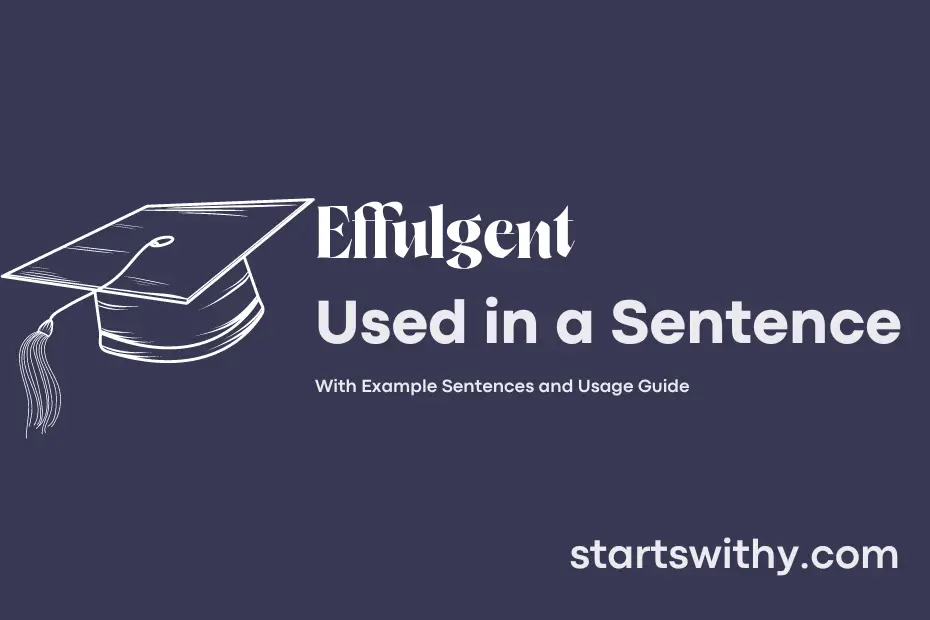Do you want to enhance your vocabulary and impress others with your command of language? Learning new words can help you do just that. One such word that can elevate your writing and speech is “effulgent.”
“Effulgent” is an adjective used to describe something that is shining brightly or giving off a radiant light. Incorporating this word into your everyday language can add depth and elegance to your communication.
7 Examples Of Effulgent Used In a Sentence For Kids
- The effulgent sun shines brightly in the sky.
- The flowers look very effulgent in the garden.
- The stars were effulgent in the night sky.
- The candles gave off an effulgent light.
- Her smile was so effulgent that it brightened up the room.
- The crystals sparkled with an effulgent glow.
- The glittering diamonds looked very effulgent in the light.
14 Sentences with Effulgent Examples
- The effulgent sun shining brightly outside made it difficult to concentrate on studying.
- The professor’s effulgent personality and passion for the subject made the lecture engaging.
- I love attending cultural fests on campus, the decorations are always so effulgent.
- The effulgent smiles of my friends during our study sessions keep me motivated.
- The library’s effulgent ambiance always puts me in the mood for productive studying.
- The effulgent artwork displayed in the college exhibition was truly inspiring.
- It’s always a pleasure to watch the effulgent performances at the annual college fest.
- Wearing traditional attire to college events adds an effulgent touch to the celebrations.
- The effulgent colors of Holi celebrations create a vibrant atmosphere on campus.
- I feel a sense of pride seeing the effulgent achievements of my fellow classmates.
- The fresh flowers in the college garden give off an effulgent fragrance that is so refreshing.
- Taking walks around the campus early in the morning, I admire the effulgent sunrise.
- The effulgent decorations during Diwali celebrations create a festive atmosphere on campus.
- The speaker’s effulgent words at the motivational seminar left a lasting impact on me.
How To Use Effulgent in Sentences?
Effulgent is an adjective that describes something as shining brightly or radiantly. To use Effulgent in a sentence, start by identifying the subject that you want to describe as radiant. For example, “The effulgent sun illuminated the whole garden with its golden light.” In this sentence, “effulgent” is used to highlight the brightness and radiance of the sun.
Alternatively, you can also use Effulgent to describe a person’s appearance or demeanor. For instance, “Her effulgent smile lit up the room and brought joy to everyone around her.” Here, “effulgent” is used to convey the idea of a bright and radiant smile.
Remember that Effulgent is a formal and descriptive word, so it is more commonly used in written English or in more sophisticated conversations. It adds a touch of elegance and specificity to your language, so use it when you want to convey a strong sense of brightness and radiance.
In summary, when using Effulgent in a sentence, make sure to identify the subject you want to describe as shining brightly, whether it’s the sun, a smile, or any other object or person. With this understanding, you can effectively incorporate Effulgent into your vocabulary to add depth and vividness to your descriptions.
Conclusion
In conclusion, the effulgent glow of a thousand twinkling stars filled the night sky with beauty and wonder. The effulgent smile on her face lit up the room, spreading warmth and joy to all those around her. These sentences with “effulgent” vividly describe something radiant, shining, and full of light, helping paint a picture of brightness and brilliance.
“Effulgent” serves as a powerful descriptor for anything that emanates light or positivity, making it a great word choice for enhancing descriptions and creating a vivid image in the reader’s mind. From shimmering stars to a radiant smile, the use of this word adds a touch of elegance and brightness to any sentence, making it a valuable addition to one’s vocabulary.



